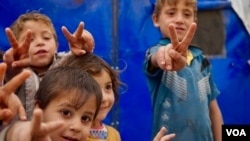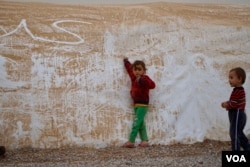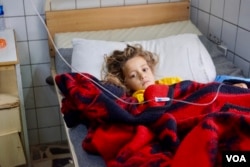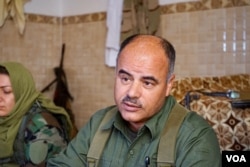On the night I arrived in Irbil, Iraqi Kurdistan's capital, a Cuban band was playing in the restaurant at my hotel. The first song I heard it perform with a distinctive Caribbean verve was John Lennon’s “Imagine.” The plea for a world without killing seemed highly appropriate, if forlorn.
Kurdistan is part of Mesopotamia, a cradle of civilization that witnessed such crucial developments in human history as the invention of the wheel, the first planting of cereal crops and the first use of cursive script. The origins of modern medicine and mathematics can be traced here. Early Sumerian inhabitants were among the first to pose existential questions such as: Who are we? Where are we? How did we get here? These helped to shape ancient Greek philosophy and subsequently our modern world.
Sadly, Mesopotamia has seen more than its share of devastating war through the centuries — pitching tribes, races, religions, countries and empires against each other in terrible cycles of conflict, revenge and retaliation.
And here we are, once again witnessing what that means in human terms.
Coming to terms
As we reporters dash around clutching old tools of the trade (a pen and notebook) and those for a high-tech age (mobile phones, digital cameras, sleek laptops and even small camera-equipped drones), we can seem all too brash and brusque, I suspect, to those whose lives have been upended and thrust into turmoil and pain.
We have deadlines to meet. We don't tread lightly — although we should be doing so, considering the number of mines and booby-trap bombs Islamic State fighters have planted all around. We shove our cameras and audio recorders in the faces of bewildered and grieving people who have endured days of hearth-thumping, stomach-turning, ground-shaking shelling, who have seen relatives killed or severely injured, and soldiers who have seen their buddies blown apart. We can, in short, come across as callous.
All I can say in defense of our reportorial bluster and striving is that the people we film and write about stay with us. The stories that fix in my mind — and play on the minds of my colleagues, I know from conversations with them — are all too often ones about children.
Thinking of the children
One child is on my mind these days: 3-year-old Noor, whose left leg was terribly injured in an airstrike two weeks ago as the Mosul offensive started. I wrote about her earlier this week.
Kurdish surgeons in Irbil are struggling to save the toddler’s leg and she’s gone through several operations. As I and my fixer, the indefatigable and kindly Dlshad Zamua, a professor of archaeology, were reporting in Mosul on Thursday, he heard that surgeons had to amputate three of the girl’s toes and remain unsure how she will progress.
Aside from Noor’s suffering now, I wonder how the injury will alter her life, how it will affect her character, her marriage prospects and the chances she’ll have kids herself. And how will that affect her family, not just in terms of the distress they feel now but through the coming years? Individual wounds injure entire families. A death doesn’t just cut off one life, the absence reduces possibilities. The Talmud says when you lose a life, you lose a world.
Sadly, of course, there are hundreds of children like Noor in Iraq and neighboring Syria.
Dlshad has been busy collecting money to buy Noor an iPad mini. Norwegian Kurds sent him money after reading VOA’s story about the Sunni girl. A Kurdish woman contacted Dlshad to say she would buy any clothes the toddler needs.
Warm welcome
The Kurdish response to the thousands of mainly Sunni Muslims streaming from Mosul has been warm. Peshmerga fighters at the checkpoints along the Mosul-Irbil highway greet the displaced civilians with cries of “on our eyes,” a traditional welcome.
The Iraqi Kurds have shown great patience with the huge numbers of displaced in their midst. Some 800,000 people – mainly Sunni Muslims, but also Christians and Kurdish Shi’ites – flooded into Kurdistan in 2014 when Islamic State militants overran Mosul and declared their caliphate of fear straddling Iraq and Syria. More than 40,000 have arrived since the Mosul offensive began more than two weeks ago. Judging by the streams of thousands leaving Mosul Thursday, there will be more waves as the fighting goes deeper into the city.
Irbil and other Kurdish towns are straining at the seams and, unsurprisingly, there is some anti-Arab sentiment in Kurdistan. It tends to bubble up when IS fighters launch assaults on Kurdish towns or when there’s any evidence of collusion between attackers and displaced Arabs in Kurdistan. Occasionally, you can see anti-Arab stickers on cars, and, much as in any other country, deeply unpleasant racist comments can be read on social media.
But considering the strain on cash-strapped Kurdistan – public-sector salaries have been cut by three-quarters, and peshmerga, doctors, teachers and municipal workers are waiting still for their meager August salaries – it is an inspiring relief that anti-Arab sentiment is not more widespread and intense.
Kurds’ moment?
The Kurds certainly feel it is their moment to establish an independent Kurdish state in northern Iraq — the first stage, they hope, in an eventual homeland that will unite Kurds in one country across the region but will be inclusive of minorities, too, they insist.
And it isn’t just the Kurds of Iraq who are on the front lines battling to realize that age-old dream.
Some have given up safe lives in Europe to come here. One is Commander Rebawar, an Iranian Kurd who for the last 20 of his 47 years had been living in Sweden and raising bees. He proudly tells me he has two hives back at the main base outside Irbil. His detachment perches above the town of Bashiqa, 30 kilometers from Mosul.
In Bashiqa, still occupied by IS militants, there are a brother and sister from Iran. In a visit earlier this week, I asked what they were doing before they enlisted with the Revolutionary Khabat Organization of Iranian Kurdistan.
“Horse smugglers,” they told me – a response I was not expecting.
Down a winding road from the Bashiqa front lines – near Iraq’soldest monastery and church, housing the tomb of St. Matthew – lies the headquarters of the peshmerga’s 7th Division. The division’s gruff, chain-smoking commander, General Nuraddin Tatarkhan, knows all about cycles of war. He’s a 36-year military veteran who fought in the Iraqi army during the Iran-Iraq war and the Persian Gulf war.
“I covered the Gulf war but from the other side,” I tell the general.
Dlshad looks on in amazement as two old guys share stories about a war that seems like ancient history now.
“Are you tired of war?” I ask the general.
He sighs. “When Kurdistan declares independence,” he says, “I will stop and write a book.”







